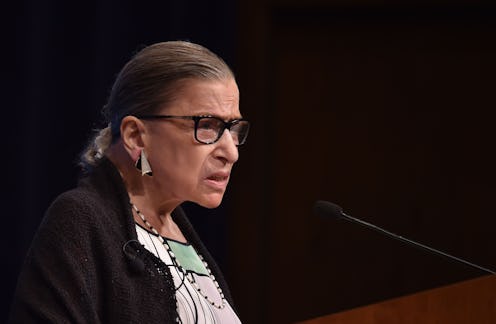News
It Just Got Harder For The Supreme Court To Stop Trump's Travel Ban

President Trump signed a new travel ban order Sunday, the same day a previous version of the same policy expired. That earlier ban was the subject of a Supreme Court case that was scheduled to begin in October, but on Monday, the Supreme Court canceled arguments for the travel ban case, and asked lawyers on both sides whether the the old lawsuit is still worth litigating in light of the newest travel ban order.
Trump has signed three different travel bans since becoming president. The first was blocked by multiple lower courts on Constitutional grounds, and so was the second; however, the Supreme Court did agree to hear arguments on the second version of the ban, and in the meantime, allowed a limited version of it to take effect. However, that second ban had a 90-day expiration date, and when it expired on Sunday, Trump signed a new one to replace it.
This third version differs from the previous two in several significant ways. For one, it's permanent. It also applies to a different set of countries than the earlier two, imposes a different set of restrictions for each country, and won't be implemented immediately. This new ban is scheduled to take effect on Oct. 18, and administration officials told The Washington Post that it will be "phased in" over time. Crucially, it won't apply to those who already hold a valid U.S. visa.
The fact that the new ban differs so much from the previous one is likely why the Supreme Court opted to cancel oral arguments in the earlier case. The court hasn't thrown out the lawsuit completely, but did acknowledge in a one-paragraph order Monday that Trump's latest travel ban may render the existing case "moot." The court directed parties on both sides to file briefs by Oct. 5 explaining why the case should, or shouldn't, continue to be tried.
The newest version of the travel ban applies to citizens from eight countries: Chad, Iran, Libya, North Korea, Somalia, Syria, Venezuela, and Yemen. The restrictions are different for each country: While Syrians will be subject to nationwide ban on entry to the U.S., for instance, Iranian exchange students will still be allowed to come to America if they pass additional screening measures. In Venezuela, only certain government officials and their immediate families will face any travel restrictions as a result of the new order.
Iraqis were restricted under the first version of the ban, but the second version dropped Iraq from the list of banned countries. The first two both applied to Sudan as well, but administration officials told the Post that Sudan was removed because the country has improved its information-sharing and security cooperation with the U.S. since the earlier ban was issued.
The first two travel bans applied to Muslim-majority countries, and were seen by many, including some federal judges, as an attempt by Trump to fulfill his campaign promise to block all Muslims from entering America. The fact that those orders could be interpreted religious-based discrimination is a big reason why the lower courts struck them down.
However, the latest version of the order applies to two countries, North Korea and Venezuela, that aren't majority Muslim. The New York Times theorized that this may be part of a broader legal strategy by the Trump administration: If countries without majority Muslim populations are also named, it's harder to argue that the order in totality is an attempt to discriminate against Muslims.
As Joshua Keating at Slate notes, there has been no suggestion even by the Trump administration that citizens of North Korea pose a security threat to the United States, as the overwhelming majority of North Koreans are prohibited from leaving their country by their own government.
The ACLU responded to the new order in a statement released Monday:
Six of President Trump's targeted countries are Muslim. The fact that Trump has added North Korea — with few visitors to the U.S. — and a few government officials from Venezuela doesn't obfuscate the real fact that the administration's order is still a Muslim ban. President Trump's original sin of targeting Muslims cannot be cured by throwing other countries onto his enemies list.